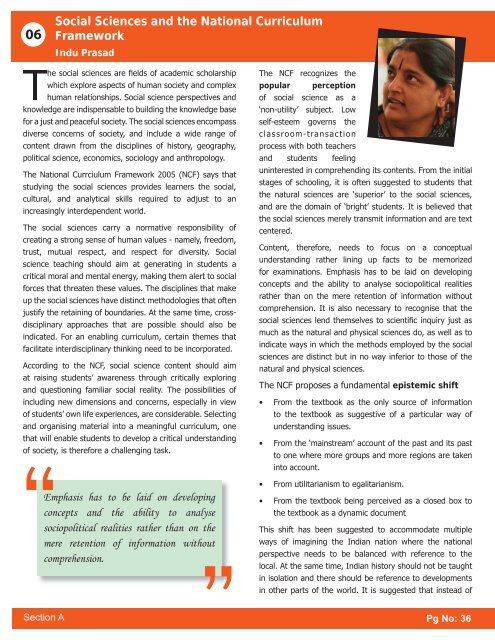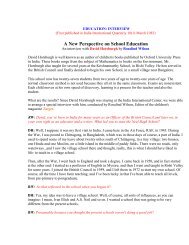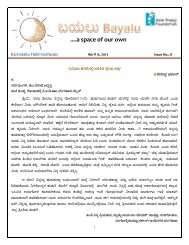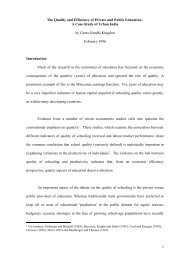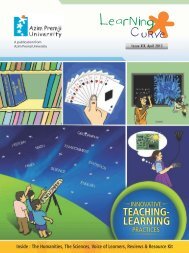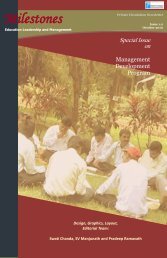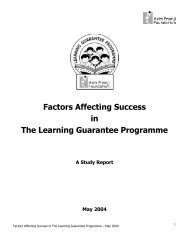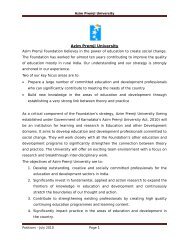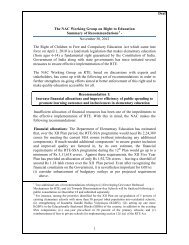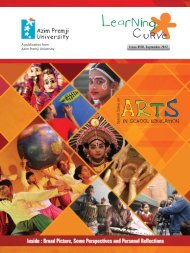Indesign Pagesnew.indd - Azim Premji Foundation
Indesign Pagesnew.indd - Azim Premji Foundation
Indesign Pagesnew.indd - Azim Premji Foundation
Create successful ePaper yourself
Turn your PDF publications into a flip-book with our unique Google optimized e-Paper software.
06<br />
Section A<br />
Social Sciences and the National Curriculum<br />
Framework<br />
Indu Prasad<br />
The social sciences are fi elds of academic scholarship<br />
which explore aspects of human society and complex<br />
human relationships. Social science perspectives and<br />
knowledge are indispensable to building the knowledge base<br />
for a just and peaceful society. The social sciences encompass<br />
diverse concerns of society, and include a wide range of<br />
content drawn from the disciplines of history, geography,<br />
political science, economics, sociology and anthropology.<br />
The National Currciulum Framework 2005 (NCF) says that<br />
studying the social sciences provides learners the social,<br />
cultural, and analytical skills required to adjust to an<br />
increasingly interdependent world.<br />
The social sciences carry a normative responsibility of<br />
creating a strong sense of human values - namely, freedom,<br />
trust, mutual respect, and respect for diversity. Social<br />
science teaching should aim at generating in students a<br />
critical moral and mental energy, making them alert to social<br />
forces that threaten these values. The disciplines that make<br />
up the social sciences have distinct methodologies that often<br />
justify the retaining of boundaries. At the same time, crossdisciplinary<br />
approaches that are possible should also be<br />
indicated. For an enabling curriculum, certain themes that<br />
facilitate interdisciplinary thinking need to be incorporated.<br />
According to the NCF, social science content should aim<br />
at raising students’ awareness through critically exploring<br />
and questioning familiar social reality. The possibilities of<br />
including new dimensions and concerns, especially in view<br />
of students’ own life experiences, are considerable. Selecting<br />
and organising material into a meaningful curriculum, one<br />
that will enable students to develop a critical understanding<br />
of society, is therefore a challenging task.<br />
Emphasis has to be laid on developing<br />
concepts and the ability to analyse<br />
sociopolitical realities rather than on the<br />
mere retention of information without<br />
comprehension.<br />
The NCF recognizes the<br />
popular perception<br />
of social science as a<br />
‘non-utility’ subject. Low<br />
self-esteem governs the<br />
classroom-transaction<br />
process with both teachers<br />
and students feeling<br />
uninterested in comprehending its contents. From the initial<br />
stages of schooling, it is often suggested to students that<br />
the natural sciences are ‘superior’ to the social sciences,<br />
and are the domain of ‘bright’ students. It is believed that<br />
the social sciences merely transmit information and are text<br />
centered.<br />
Content, therefore, needs to focus on a conceptual<br />
understanding rather lining up facts to be memorized<br />
for examinations. Emphasis has to be laid on developing<br />
concepts and the ability to analyse sociopolitical realities<br />
rather than on the mere retention of information without<br />
comprehension. It is also necessary to recognise that the<br />
social sciences lend themselves to scientifi c inquiry just as<br />
much as the natural and physical sciences do, as well as to<br />
indicate ways in which the methods employed by the social<br />
sciences are distinct but in no way inferior to those of the<br />
natural and physical sciences.<br />
The NCF proposes a fundamental epistemic shift<br />
•<br />
•<br />
•<br />
•<br />
From the textbook as the only source of information<br />
to the textbook as suggestive of a particular way of<br />
understanding issues.<br />
From the ‘mainstream’ account of the past and its past<br />
to one where more groups and more regions are taken<br />
into account.<br />
From utilitarianism to egalitarianism.<br />
From the textbook being perceived as a closed box to<br />
the textbook as a dynamic document<br />
This shift has been suggested to accommodate multiple<br />
ways of imagining the Indian nation where the national<br />
perspective needs to be balanced with reference to the<br />
local. At the same time, Indian history should not be taught<br />
in isolation and there should be reference to developments<br />
in other parts of the world. It is suggested that instead of<br />
Pg No: 36


